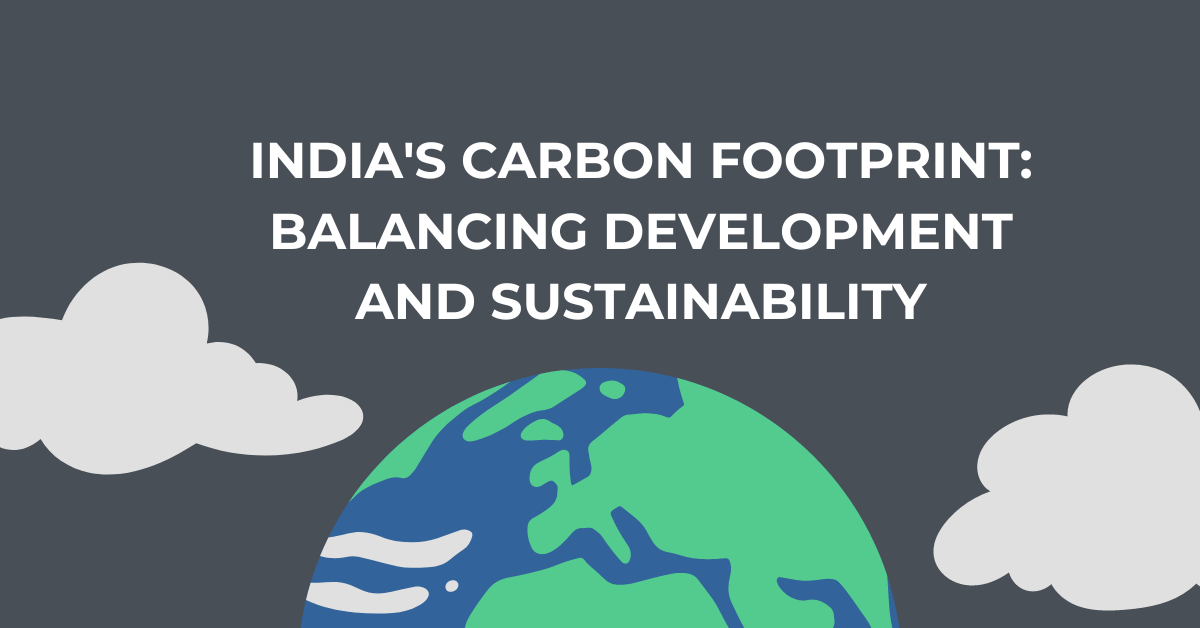India is a country with a thriving economy and a lively culture, but it also has a big problem...
The narrative of a futuristic world dominated by climate change challenges is no longer science fiction. As of July 2021, Earth has experienced its highest recorded temperatures, exceeding the 20th century average by 1.67°F (0.93°C). This alarming trend is directly linked to the rising concentration of CO2 in our atmosphere.
The amount of carbon dioxide released daily is increasing, with dire consequences for the entire world. It is safe to conclude that the sooner we start taking our carbon footprint seriously, the easier it will be to make positive changes, even though scientists are unable to forecast with certainty what will happen when the quantities of carbon in the atmosphere continue to rise.
10 Simplest ways to reduce the carbon Footprint
Avoid single use of plastic: For every tonne of plastic that is produced, five tons of carbon dioxide are emitted into the environment. Additionally, single-use plastic pollutes beaches and oceans, endangering thousands of species and endangering marine life. The good news is that with little effort, anyone can help reduce the use of plastic.
The minimization of single-use plastics presents a readily achievable opportunity to demonstrably reduce environmental impact. Replacing disposable takeout containers and grocery bags with reusable alternatives offers a cost-effective and sustainable solution.
Similarly, the utilization of a reusable glass or stainless steel water bottle promotes both hygiene and optimal temperature control for beverage consumption, eliminating the need for single-use plastic options.
Furthermore, the adoption of reusable metal or bamboo straws and utensils ensures preparedness when encountering disposable plastic cutlery, fostering a more environmentally responsible approach. These seemingly minor modifications in daily routines collectively contribute to a significant reduction in plastic waste, promoting a culture of environmental sustainability for the benefit of current and future generations.
With the decision of numerous governments and international organizations to outlaw single-use plastic, more companies became conscious of the environmental impact of their products. Consequently, To make the switch from single-use plastic easy and inexpensive, there are sustainable alternatives. So, if you want to join this movement, your budget won’t suffer.
Buy Local Products: Purchasing food locally has several benefits as it lowers food miles. There is less fuel used and fewer pollutants when your food doesn’t have to travel hundreds or thousands of miles to reach your table, thus significantly reducing emissions throughout the entire supply chain. Studies show that sourcing food locally can result in up to a 5-25% reduction in greenhouse gas emissions compared to products that are transported over long distances.
Local farmers can also use fewer pesticides and preservatives as the food doesn’t need to be treated to travel. The method needed to create food becomes more environmentally friendly when there are fewer or no chemical products involved, which continues to have a direct and indirect impact on the community’s carbon footprint.
Additionally, there are some advantages. Your meals will taste better and be healthier at the same time. In addition, you get to handle fewer packages, which lowers the amount of plastic consumed, and you get to help the neighborhood.
Eliminate food Waste: Increasing the intentionality of your food purchasing is another easy method to lessen your carbon footprint. To prevent storing food in your fridge that spoils before you can cook it, plan your meals and only buy what you can consume.
Additionally, consider implementing wet waste composting as a sustainable solution. By composting your food scraps, you not only divert waste from landfills but also create nutrient-rich soil for your own garden.
Growing your own organic vegetables not only reduces the carbon emissions associated with transportation but also promotes a more sustainable and self-sufficient lifestyle. It’s a simple yet impactful way to minimize your environmental impact while enjoying fresh, homegrown produce.
You may save money on groceries while simultaneously helping the environment, as food waste accounts for six to eight percent of greenhouse gas emissions globally.
Does this imply that you can’t make bulk purchases to save money? Not always. You should not experience food waste problems as long as you store food correctly and keep an eye out for expiration dates.
Reduce Solid Waste: Everything you toss away increases the carbon footprint of a community because, once it reaches a landfill, solid waste produces greenhouse gases and begins to decompose due to microbial activity.
Wearable clothing can be donated, recyclable materials can be repurposed, and items like bottles, dispensers, and containers can be reused. Here, the packaging is the game-changer. The simplest method to lower the amount of packaging and containers in municipal solid trash is to pay attention to how things are packaged when making purchases.
Additionally, as a business owner, consider how you may use recyclable packaging to both lessen your carbon footprint and assist your clients in doing the same.
Take good care of your car: Your car emits approximately 4.6 metric tons of carbon dioxide yearly, according to data. The good news is that with careful driving and routine maintenance, you can reduce the number.
Additionally, embracing pocket-friendly solutions like carpooling not only reduces emissions but also cuts down on fuel costs, making it a win-win for both your wallet and the environment.
By sharing rides, you can significantly decrease the number of vehicles on the road, leading to a collective reduction in carbon emissions and traffic congestion. It’s a small change that yields big environmental benefits.
Anything that generally results in higher gas mileage also generally results in higher CO2 emissions. You can lessen your influence on the environment when driving by abstaining from careless driving, speeding, and needless braking. Moreover, you can immediately increase gas mileage and lower emissions by maintaining proper tire inflation, changing filters regularly, and getting all of your sensors serviced.
You might also think about trading in your car for a more environmentally friendly model if you’re willing to go above and beyond. For example, it is well known that electric and hybrid vehicles produce less pollution.
Drive Less when Possible: You can dramatically lower your carbon impact by driving less. Your carbon footprint can be 84% smaller than if you drove one day a week and switched to riding a bike. Although it’s not always practical, you should make an effort to drive less whenever you can. Develop the habit of walking and riding a bike as much as you can by starting with short outings at first.
It’s a free form of exercise that can improve your wellbeing. Walking is not only good for the environment, but it can also help you move better, lose weight, and maintain your long-term health.
Make your Home energy efficient: Improving your home’s energy efficiency is another long-term strategy to lower your carbon impact and save costs. Make sure you use energy-efficient solutions each time you need to make a home renovation investment. It might be anything from upgrading your roof and windows to insulating your house with eco-friendly materials.
In addition to the environmental benefits, you’ll save costs, increase the value of your property, and possibly even obtain a better quote on home insurance.
Plant Trees: Are you living in a home with a yard? Consider the potential that trees offer for your land. They will help you save money on heating and cooling by acting as a wind barrier in the winter and offering natural cooling benefits in the summer.
Your energy consumption will decrease as well as your carbon footprint. In addition, trees produce oxygen and eliminate carbon dioxide from the atmosphere, resulting in cleaner air, more comfort, and a more favorable climate.
Save Water: The energy-intensive procedures involved in obtaining water for your home have a significant impact on greenhouse gas emissions. To put it simply, your carbon footprint increases with the amount of water you pump and heat.
However, embracing rainwater harvesting can be a game-changer. By capturing rainwater, not only do you reduce reliance on energy-intensive water sources, but you also mitigate stormwater runoff, erosion, and flooding. This sustainable practice not only lowers your carbon footprint but also conserves precious freshwater resources, making it a vital step towards a greener, more sustainable future.
Leak removal, water-saving showerhead use, and shutting off the water when shaving or brushing your teeth are a few simple techniques to reduce water consumption. Even if they are minor actions, daily implementation of them can have a positive impact on the environment and your water cost.
How Climekare helps reduce the carbon footprint: Services from Climekare enable small-scale renewable energy production. Even though state laws and expenses may prevent you from switching entirely to renewable energy sources, our solutions can help you meet part of your daily energy needs.
The technology simultaneously produces bio-fertilizers that can be utilized to boost agriculture through the anaerobic digestion of organic materials. You can even cut down on food miles by growing some of your food.


